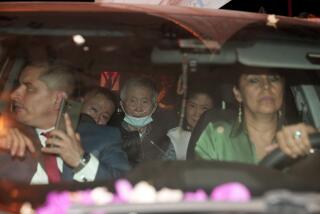New Hope in the Land of the Incas
- Share via
More than 500 years ago the Inca Empire stretched from the Amazon to the Andes, ruled by one chief, the Inca, from a stronghold in Peru. The Inca ruled because, with a sundial carved of stone, he was wise and powerful enough to control the waxing and waning of the seasons. After winter’s scarce, thin sunlight, the Inca would call the sun, the Inti, to return and bless the empire.
If only such a mystical device existed today. For Peru’s new president-elect, Alberto Fujimori, may need a touch of shamanism to bring prosperity back to Peru.
When Fujimori is inaugurated July 28, he will inherit an awesome list of problems: An inflation rate of more than 2,000%. Bitter racial and class differences that divide Peruvians of Indian and Hispanic descent. A war against a tough guerrilla army with an ideology of indiscriminate violence that so far claims 20,000 lives and shows no signs of abating. And fertile acres dedicated to the Andean region’s only paying cash crop--coca leaves, the source of America’s cocaine plague. Compounding his financial problems, Fujimori will also have to renew ties with international bankers who cut off credit to outgoing President Alan Garcia.
The son of Japanese immigrants, Fujimori appeared on Peru’s political scene just a few months ago. A dark horse with no political experience, he trounced conservative Mario Vargas Llosa, the world famous novelist.
Exit polls indicate Fujimori’s victory was due to his popularity among rural and lower-class Peruvians who found the traditional political structure unable to offer any promise that a way out of Peru’s political morass can be found.
The Bush Administration plans to send $35 million in military aid and U.S. military advisers to Peru’s most conflict-ridden region to train the military to fight both drug trafficking and the guerrillas, battles the Peruvians have in the past been loath to fight and which Fujimori says militarization has only worsened.
Fujimori’s election sparked music and dancing among the descendants of the Incas. They are hoping that he will garner enough international support to break Peru’s cycle of destitution and violence. They are clamoring for crop subsidies to diminish the attractions of growing coca. They are clamoring for employment and health care in the hope the guerrillas will fade away.
The United States should work cooperatively with Fujimori, who wants input and help in formulating new economic policy. Washington should also support the necessary, if difficult, route of economic development. This is certainly as critical a juncture in Peruvian history as the rise and fall of the Inca: No talisman will be as effective as truly well-targeted international aid.
More to Read
Sign up for Essential California
The most important California stories and recommendations in your inbox every morning.
You may occasionally receive promotional content from the Los Angeles Times.













